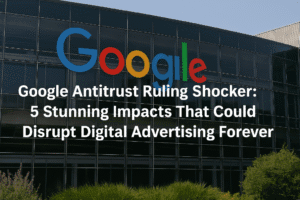Google Antitrust Ruling Shocker: 5 Stunning Impacts That Could Disrupt Digital Advertising Forever
A U.S. federal judge has ruled that Google unlawfully monopolized key parts of the digital advertising market, specifically targeting its dominance in publisher ad servers and ad exchanges. This landmark decision opens the door for the DOJ to seek structural remedies, potentially including a breakup of Google’s $238 billion ad-tech business. While claims over advertiser networks were dismissed, the ruling highlights mounting pressure on Big Tech’s vertical integration strategies.
Google plans to appeal, arguing it competes fairly amid rising challenges from rivals like Amazon and evolving ad trends. Legal experts see parallels with past antitrust cases but note today’s regulators are more aggressive. A breakup could reshape the ad-tech landscape, benefiting smaller players and content publishers, while also triggering regulatory momentum globally. As scrutiny intensifies, this case marks a pivotal moment in reining in tech giants and redefining competition in the digital economy.

Google Antitrust Ruling Shocker: 5 Stunning Impacts That Could Disrupt Digital Advertising Forever
Federal Judge Rules Against Google in Landmark Antitrust Case: What It Means for the Future of Digital Advertising
A federal court has delivered a pivotal blow to Alphabet’s Google, ruling that the tech giant unlawfully monopolized critical segments of the online advertising technology market. The decision, issued by U.S. District Judge Leonie Brinkema in Virginia, underscores escalating regulatory scrutiny of Big Tech’s dominance and sets the stage for potential seismic shifts in the digital ad industry.
The Core of the Ruling
Judge Brinkema determined that Google abused its market power in two areas:
- Publisher Ad Servers: Tools used by websites to manage ad inventory.
- Ad Exchanges: Digital marketplaces where ads are bought and sold in real-time.
However, the court dismissed claims that Google monopolized advertiser ad networks, which connect brands to publishing platforms. This mixed verdict highlights the complexity of antitrust litigation in multifaceted tech ecosystems.
Implications for Google’s Ad Empire
The ruling empowers the U.S. Department of Justice (DOJ) to pursue structural remedies, including a possible breakup of Google’s $238 billion ad-tech business. Prosecutors have previously urged the court to compel Google to divest parts of its Google Ad Manager suite—a bundle of tools that critics argue creates an unfair “self-preferencing” loop, favoring Google’s own services over competitors.
This case isn’t isolated. Next week, a separate trial in Washington, D.C., will address Google’s alleged monopoly in online search, where the DOJ seeks to force the company to sell its Chrome browser. Combined, these cases signal a coordinated effort to dismantle Google’s layered dominance across digital markets.
Google’s Defense and Road Ahead
Google has vowed to appeal, with Vice President Lee-Anne Mulholland stating, “Publishers choose Google because our tools are effective—not because of anticompetitive practices.” The company argues that regulators overlooked competition from rivals like Amazon and Comcast, as well as shifting ad spend toward streaming and apps.
Legal experts note parallels to historic antitrust battles, such as the U.S. vs. Microsoft case, which resulted in behavioral reforms rather than a breakup. However, the DOJ’s renewed vigor under the Biden administration suggests a tougher stance.
Broader Industry Impact
- Competition Revival: A breakup could empower smaller ad-tech firms, fostering innovation and lowering costs for advertisers.
- Publisher Dynamics: Content creators might gain leverage in ad revenue negotiations if Google’s control over server-to-exchange workflows weakens.
- Global Ripple Effects: The EU is already probing Google’s ad practices, and this ruling could accelerate similar actions abroad.
Expert Insights
Antitrust scholars emphasize the case’s precedent-setting potential. “This isn’t just about Google—it’s about whether tech giants can vertically integrate critical infrastructure without stifling competition,” notes Dr. Laura Peterson, a regulatory analyst. Others caution that fragmentation could complicate digital ad buying, initially creating chaos for marketers.
The Bigger Picture: Tech Under Scrutiny
The ruling reflects a global regulatory shift. From the EU’s Digital Markets Act to U.S. lawsuits against Meta and Amazon, governments are reining in tech power. For Google, the path forward involves not just legal battles but reimagining its business model in an era where “move fast and break things” collides with antitrust enforcement.
What’s Next?
- Appeal Process: Google’s challenge could delay any breakup by years.
- Remedy Phase: Courts will weigh solutions—divestiture, fines, or operational restrictions.
- Industry Watch: Competitors like The Trade Desk or Microsoft may seize opportunities in a reshaped ad-tech landscape.
As the digital ad market braces for transformation, one truth emerges: The age of unchecked tech dominance is waning, and the rules of engagement are being rewritten.
You must be logged in to post a comment.